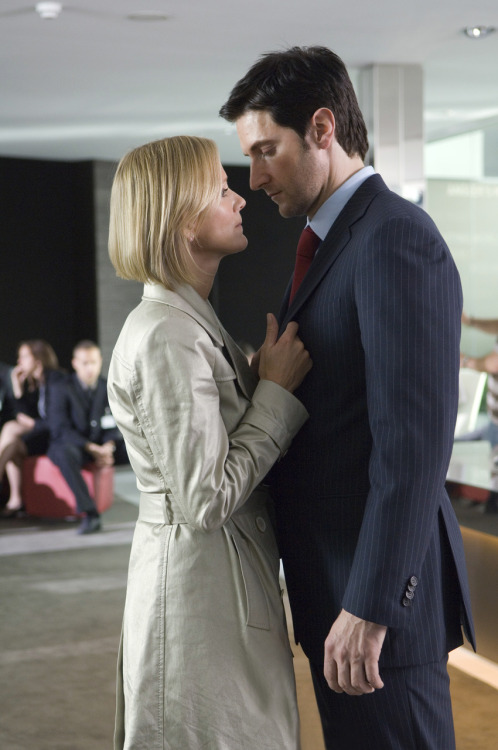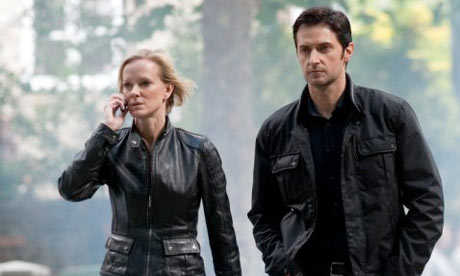I am clearly not English and try not to pretend to be. However, as I think I am making fairly clear, I love the English approach to drama - and maybe the English approach to life. In typical fashion, I like to think about why.
Brace yourself, what is coming next is going to sound a little bit more like scholarship and less like TV, but its still kinda cool. (It was either this or "Rate the Emmas." But look for that topic coming soon.)
Recently reading the book
Outliers, by Malcolm Gladwell, I was struck by his chapter on "The Ethnic Theory of Plane Crashes." In it, Gladwell draws upon the work of a Dutch psychologist, Geert Hofstede, to support the idea that culture may play a role in plane crashes. Specifically, Gladwell asserts that how certain cultures tolerate ambiguity or deal with hierarchy can explain how pilots from that culture behave in the cockpit, which can in turn explain the frequency of crashes. Its interesting stuff and can be found in his book on pages 202-08.
What does that have to do with British drama? Absolutely nothing. I mention it only because it's the inspiration for what I've been thinking about. Though sparked by Gladwell, my interest in the Hofstede dimensions is a bit broader than plane crashes and involves the idea that maybe combinations of Hofstede traits could almost spell out a kind of cultural personality trait -- a way of understanding both what culture I am from and what cultures I am drawn to. If you want to look at his work in depth, check out his website here:
Geert Hofstede Dimensions
Hofstede's extensive work on this topic, involves assessing various countries on four main dimensions that he calls "power distance," "individualism," "masculinity," and "uncertainty avoidance." He has added a couple other factors to his work, that I plan to ignore. For about 70 different countries, he assigns numeric values for these factors that basically represent whether a country/culture is high in that trait or not. I hope that makes sense because I really do not want to get in to exactly what these scale values mean. Suffice it to say a high number for a given factor means that that culture has a lot of the factor he is measuring. (Come on, this is a blog about tv, you're expecting hard scientific analysis?)
In brief, "power distance" (PDI) refers to the way in which members of a culture accept a hierarchical power structure. A high number on this factor means there is a large difference between those with power and those without
and that those without power accept that division fairly well. A low number means that power is more spread out and that the society is more egalitarian. The U.S. has a fairly low power distance score of 40.
"Individualism" (IDV) refers to the extent to which people from a given county view themselves as individuals and are expected to look out for themselves. It is not surprising that the U.S. has a very high score on individualism, 91; actually the highest of all the countries Hofstede studied.
The "masculinity" dimension is a very obscure one, referring not just to whether the culture is dominated by a more traditionally male approach to life, but also to how the women in that culture assume more traditionally male ways. This factor is a little too unwieldy for me to deal with in this blog. Just to throw it out there, the U.S.' masculinity score is 62.
The last major Hofstede dimension is "uncertainty avoidance" and is an interesting one. It deals with whether a culture likes to have a lot of structure and strict rules. Such a culture, with a high score on this factor, does not tolerate ambiguity well and tends to insist that its members follow strict rules and safety measures, and even tow a particular religious or philosophical line. A low score characterizes countries that accept a variety of viewpoints, are more relativistic and less emotional. The U.S. has a score of 46.
OK. To recap, the U.S. has scores of 40, 91, 62 and 46 on PDI, IDV, MAS, and UAI. Scanning the list for other countries that have a similar pattern of scores, I quickly found that the U.K., Canada, and Australia were all fairly similar to the U.S.. Makes total sense. But, beyond that, other cultures were all very different from the U.S.. Take a look at this chart I just made with just a few of the countries Hofstede studied.
| PDI | IDV | MAS | UAI |
| U.S. | 40 | 91 | 62 | 46 |
| U.K. | 35 | 89 | 66 | 35 |
| Austrailia | 36 | 90 | 61 | 51 |
| Canada | 39 | 80 | 52 | 48 |
| France | 68 | 71 | 43 | 86 |
| Germany | 35 | 67 | 66 | 65 |
| Spain | 57 | 51 | 42 | 86 |
| Mexico | 81 | 30 | 69 | 82 |
| China | 80 | 20 | 66 | 30 |
| Arab World* | 80 | 38 | 52 | 68 |
| | | | |
| *this is Hofstede's amalgam of Egypt, Iraq, Kuwait, |
| Lebanon, Libya, Saudi Arabia, and United Arab Emirates |
| | | | |
So many things to notice! Like, Mexico is far more similar to the Arab World and even China than it is to Spain. France and Spain are fairly similar. Germany is similar to the U.K. on the first three factors, but dramatically different in uncertainty avoidance (i.e. Germany has more rules and structure). I didn't include more countries on my little chart because its all available on Hofstede's website for those who want more, and the main thing I wanted to do was look at my own culture and compare it to that of the U.K.
I have to admit I was a bit disappointed at first to see how similar we are. I was looking for some big discrepancy that would explain everything. (Aha! I would say. That is the reason). But the differences are subtle. And maybe the closeness between our two cultures is part of what makes the British feel so accesable to me. (Duh). But, although they are very like us, the British are different in a few key ways on Hofstede's dimensions. The biggest difference is in our uncertainty avoidance factor. Great Britain's uncertainty avoidance score is a quite low 35 (compared to the U.S.' 46). This is by no means the lowest of all the countries he looked at (Denmark, China and Jamaica are a few of those that are lower), however it is quite a bit lower than the U.S.. Thus, the U.K. is a bit more relativistic or accepting culture than the U.S., according to that factor -- but not so much so that there are no rules and order. A low score here is a marker of a non-emotional culture. It surprises no one that the English are cool and un-emotional.
The other factor that shows an interesting difference between our two countries is the power distance marker. Recall that this refers to how strict and hierarchical the distribution of power is. In the U.K., this score is 35 (compared to 40 for the U.S). Again, that is a pretty low number. There are other countries (like Austria, Denmark, Israel and New Zealand) that score lower, but by a worldwide standard, the U.K. is a country that seeks and demands equality at all levels of society.
The U.K. is like the U.S., but a bit more egalitarian, a bit more accepting, a bit less emotional, a bit less structured and controlled, and maybe a tiny bit more concerned with the collective culture than the individual. It is no wonder I love that place.
Wouldn't it be fun to think about the traits that you really value and then look for countries that match it?
The English Way I. LostinBritishTV













